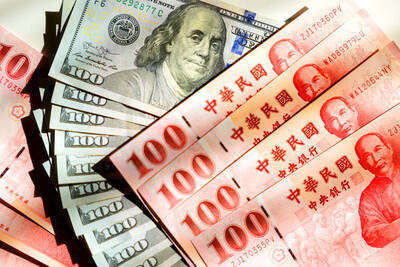Vietnam’s inflation quickened this month after the government increased fuel prices by a record amount to pass on rising oil costs.
The consumer-price index (CPI) rose 1.6 percent from last month, when it gained 1.1 percent, the General Statistics Office said yesterday in Hanoi. Annual inflation accelerated to 28.3 percent, the fastest pace since at least 1992, from 27 percent last month.
The government last month lifted the cost of the most commonly used grade of gasoline by almost a third, adding to investor concern that accelerating inflation in Vietnam, which already has Asia’s highest rate, would destabilize growth.
“We all expected inflation to quicken after the government raised fuel prices, but it’s not as bad as we thought,” said Nguyen Manh, Hanoi-based director of treasury at Bank for Investment & Development of Vietnam (BIDV).
BIDV, the second-biggest lender by assets, had expected consumer prices to gain at least 2 percent, Manh said.
Prices in the category including transport led the index higher, rising 9.1 percent after gains of 0.6 percent last month. From a year earlier, transport costs were up 25.6 percent, compared with 15.3 percent last month.
Vietnam needed to lower costs for the government by cutting fuel subsidies to state-owned retailers, Vietnamese Finance Minister Vu Van Ninh said after last month’s increase, the first since February.
The increase was in response to a 20 percent surge in crude oil costs this year. Crude oil has dropped more than 21 percent after a record US$147.27 a barrel on July 11.
Vietnam’s finance ministry on Aug. 14 lowered fuel costs by 5.3 percent to “reduce the cost of goods and ensure consumers’ benefit.”
The CPI rose less than expected by the country’s three brokerages, indicating the government’s measures to rein in inflation are taking effect. Vietcombank Securities, Saigon Securities Inc and Bao Viet Securities had all expected an average monthly increase of more than 2 percent.
The central bank has raised the benchmark interest rate three times this year to 14 percent, the highest in Asia, and has boosted reserve requirements for banks. The country also wants to keep credit growth below 30 percent and is reducing government spending by 10 percent this year.
The benchmark VN Index yesterday gained 21.27, or 4 percent, to 548.25, the highest since April 9. The bellwether five-year bond rose for a second day, pushing down yields by 6 basis points to 16.31 percent, the lowest since May 30.
“It’s a good sign for the Vietnamese economy, because a lot of investors thought the CPI for August was going to be 3 percent,” said Nguyen Pham Quoc Phong, an investment specialist at Cathay Life Insurance in Ho Chi Minh City.
Declining global food prices also meant inflation quickened less than expected.
Food prices fell 1.1 percent this month, after dropping 0.4 percent last month, the statistics office said. From a year earlier, food prices increased 69.4 percent, after gains of 72.7 percent last month.

WEAKER ACTIVITY: The sharpest deterioration was seen in the electronics and optical components sector, with the production index falling 13.2 points to 44.5 Taiwan’s manufacturing sector last month contracted for a second consecutive month, with the purchasing managers’ index (PMI) slipping to 48, reflecting ongoing caution over trade uncertainties, the Chung-Hua Institution for Economic Research (CIER, 中華經濟研究院) said yesterday. The decline reflects growing caution among companies amid uncertainty surrounding US tariffs, semiconductor duties and automotive import levies, and it is also likely linked to fading front-loading activity, CIER president Lien Hsien-ming (連賢明) said. “Some clients have started shifting orders to Southeast Asian countries where tariff regimes are already clear,” Lien told a news conference. Firms across the supply chain are also lowering stock levels to mitigate

Six Taiwanese companies, including contract chipmaker Taiwan Semiconductor Manufacturing Co (TSMC, 台積電), made the 2025 Fortune Global 500 list of the world’s largest firms by revenue. In a report published by New York-based Fortune magazine on Tuesday, Hon Hai Precision Industry Co (鴻海精密), also known as Foxconn Technology Group (富士康科技集團), ranked highest among Taiwanese firms, placing 28th with revenue of US$213.69 billion. Up 60 spots from last year, TSMC rose to No. 126 with US$90.16 billion in revenue, followed by Quanta Computer Inc (廣達) at 348th, Pegatron Corp (和碩) at 461st, CPC Corp, Taiwan (台灣中油) at 494th and Wistron Corp (緯創) at

NEW PRODUCTS: MediaTek plans to roll out new products this quarter, including a flagship mobile phone chip and a GB10 chip that it is codeveloping with Nvidia Corp MediaTek Inc (聯發科) yesterday projected that revenue this quarter would dip by 7 to 13 percent to between NT$130.1 billion and NT$140 billion (US$4.38 billion and US$4.71 billion), compared with NT$150.37 billion last quarter, which it attributed to subdued front-loading demand and unfavorable foreign exchange rates. The Hsinchu-based chip designer said that the forecast factored in the negative effects of an estimated 6 percent appreciation of the New Taiwan dollar against the greenback. “As some demand has been pulled into the first half of the year and resulted in a different quarterly pattern, we expect the third quarter revenue to decline sequentially,”

The New Taiwan dollar yesterday extended its losing streak to a fifth straight session, closing at NT$29.719 against the US dollar, down NT$0.13 from the previous day, as broad US dollar strength and lingering trade uncertainties weighed on non-US dollar currencies, traders said. The NT dollar depreciated NT$0.357, or 1.21 percent, against the greenback over the past five trading days, central bank data showed. Turnover at Taipei Forex Inc fell to US$878 million, reflecting subdued investor activity as markets await Washington’s tariff rate on Taiwan. “The US dollar index has shown significant strength in recent sessions, putting pressure on non-dollar currencies,” a Taipei-based